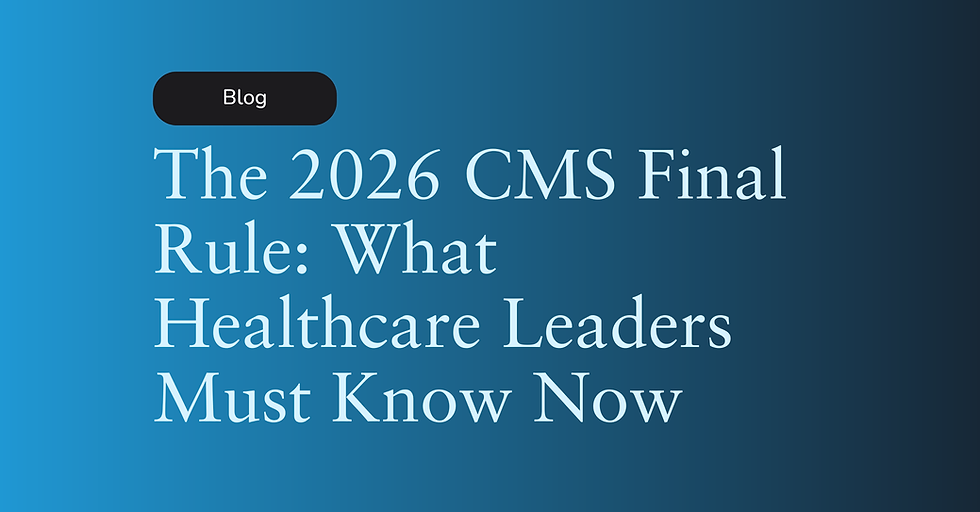Get Paid for the Care You’re Already Providing: How Advanced Primary Care Management (APCM) is Reshaping Revenue for Primary Care Practices
- Dr. Larry Blosser

- Apr 1
- 3 min read
Updated: Sep 15
Unlocking Hidden Revenue: How APCM Turns Everyday Primary Care Into Monthly Medicare Payments

Advanced Primary Care Management (APCM) is a groundbreaking CMS payment model that enables primary care providers to receive recurring monthly payments for non-office-based care coordination. Unlike traditional fee-for-service billing, APCM compensates providers for essential services they already deliver, such as medication management, lab follow-ups, patient education, and care coordination with specialists. This model not only reduces administrative burden but also makes it easier for practices to support patients with chronic conditions while generating sustainable revenue. APCM redefines how value-based care is delivered by transforming routine, previously unreimbursed tasks into a predictable income stream.
Understanding APCM Payment Tiers
CMS structured APCM payments around three tiers of patient complexity, creating a straightforward way to capture revenue for services already being delivered:
Tier | Patient Type | Monthly Payment |
Tier 1 | Medicare with 1+ chronic conditions | ~$15 |
Tier 2 | Moderate complexity (most common) | ~$50 |
Tier 3 | High complexity or QMB patients | Up to $110 |
FQHCs | Use G codes | Alternative billing path |
These tiers reflect the increasing clinical effort and coordination needed as patient complexity rises. For example, a Tier 3 patient may require ongoing education, medication titration, and collaboration across multiple specialists' work that was previously uncompensated under traditional models.
APCM vs. CCM: What's the Difference?
APCM is often described as a "better version of CCM," and for good reason. It removes many of the barriers that make chronic care management frustrating for small and midsize practices.
Furthermore, APCM expands the pool of eligible Medicare patients by requiring only one chronic condition, compared to the two required for CCM. It also opens the door for patients without chronic conditions who still need ongoing care management to qualify.
Comparison: Chronic Care Management (CCM) vs. Advanced Primary Care Management (APCM)
Feature | CCM | APCM |
Eligible Providers | Any specialty | Primary care only |
Time Requirements | 20+ minutes/month | No time requirement |
Consent Needed | Written only | Verbal or written |
Documentation Burden | High | Low |
Monthly Reimbursement | ~$62 | $15–$110 |
Flexibility | Often tied to third-party services | Practice-led with software support |
Billing Simplicity | Complex | Streamlined 3-tier model |
Why Now is the Time to Act
Because APCM is still relatively new, many primary care providers are unaware of its benefits. But those who act now can gain a first-mover advantage, transforming underutilized workflows into a recurring, scalable revenue stream that aligns with value-based care goals. Participation in an Advanced Primary Care Model (APCM) requires more than a commitment to high-value care delivery; it also depends on meeting CMS quality reporting and submission requirements.
Your organization must participate in a quality program, such as MIPS, which is essential to validating performance, ensuring practices receive credit for the work they’re already doing, and unlocking the financial benefits of APCM participation.
Integrating APCM with a quality reporting strategy isn't optional; it’s foundational.
Practices that fail to align with CMS quality measures may miss out on APCM payments or fall short of performance thresholds that maximize reimbursement. Accurate, timely submission ensures your practice complies with program requirements and captures the full value of your clinical efforts.
By leveraging a vendor like ReportingMD, practices can streamline reporting, cut costs, and ensure CMS compliance, turning APCM from a complex policy into a simple, growth ready solution.

According to Dr. Larry Blosser, Chief Medical Officer at ReportingMD and quality care advocate:
“Practices are already doing this work; it’s time they got paid for it.”





Comments